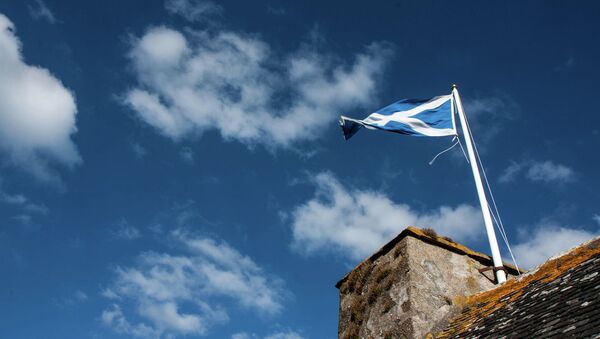GLASGOW, April 16 (RIA Novosti), Mark Hirst – A combination of factors may affect the results of the upcoming referendum on Scottish independence, making an accurate prediction all but impossible, opinion pollster Mark Diffley of Ipsos Mori Scotland told RIA Novosti Tuesday.
The popular vote is scheduled for September 18, and will ask voters a simple yes-or-no question: “Should Scotland be an independent country?”
“You have a situation where you have one in ten as answering the question as being undecided, you have a further 15 percent who give an answer yes or no but who tell us when pushed that they may change their mind between now and September,” Diffley said.
“Then you have a further 20 or 25 percent who say they may not even bother turning up to vote. Put all those people together and you have somewhere between 40 and 50 percent of the entire electorate,” he added, concluding it would be “foolish to try and predict an outcome at this stage,” as there is still time for campaigning.
A further complication to poll-based prediction is the methodology. Alistair Graham of survey group TNS Scotland told RIA Novosti that polling companies monitoring the independence campaign were all using different methods to obtain their data.
“The lead that the ‘no’ campaign had of 19 percent, when we started polling, has gone down to 7 percent. That is a more significant change,” he told RIA Novosti, explaining that although there were differences in the polling results the trend towards “yes” across all polls is significant.
Blair Jenkins, the Chief Executive of Yes Scotland, finds extremely encouraging the fact that “the gap between 'yes' and 'no' has already closed by two-thirds.”
“What is particularly significant is that ‘yes’ actually has a strong majority if people think that they and their families would be better off in an independent Scotland and the official figures show that Scotland would be the 14th richest country in terms of economic output per head, compared to the UK's 18th place,” Jenkins added, hopeful “to win the argument that we should and must vote ‘yes.’”
Experts largely agree that opinion polling ahead of Scotland’s historic vote on independence on September 18 may be masking underlying trends, pointing to the undecided voters as the source of the vague forecasts.
“There is this large proportion of undecided voters and what we have picked up is that much of that group is still seeking answers and information. Many of the questions they are seeking boil down to the economy and personal finance issues,” Graham added.
Another polling expert, Professor John Curtice of Strathclyde University, reiterated the importance of undecided voters, who are formed of two distinct groups.
“You have about half the electorate absolutely clear about how they will vote. You’ve got another 15 percent who have got a darn good idea which way they will vote, but might still change their mind. Then you have the rest gradually moving towards complete indecision,” Curtice told RIA Novosti.


